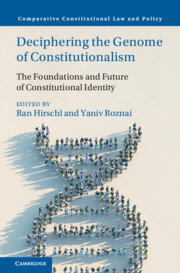Book contents
- Deciphering the Genome of Constitutionalism
- Comparative Constitutional Law and Policy
- Deciphering the Genome of Constitutionalism
- Copyright page
- Contents
- Figures
- Contributors
- Preface
- Acknowledgments
- Introduction
- Part I Foundations, Theory, and Concepts
- 1 Rousseau’s Sovereignty and the Concept of Constitutional Identity
- 2 Constitutional Identity
- 3 Constitutional Identity as Discourse
- 4 Constitutional Identity and Constitutional Revolution
- 5 The Death of Constituent Power
- 6 Constitutional Identity as a Source of Ontological Security
- 7 The Crisis in, and of, Constitutional Identity
- Part II Comparative Perspectives
- Part III American Constitutionalism and Constitutional Identity
- Part IV Emerging Trends
- Index
- References
3 - Constitutional Identity as Discourse
Mis-identity and Dis-identity
from Part I - Foundations, Theory, and Concepts
Published online by Cambridge University Press: 14 March 2024
- Deciphering the Genome of Constitutionalism
- Comparative Constitutional Law and Policy
- Deciphering the Genome of Constitutionalism
- Copyright page
- Contents
- Figures
- Contributors
- Preface
- Acknowledgments
- Introduction
- Part I Foundations, Theory, and Concepts
- 1 Rousseau’s Sovereignty and the Concept of Constitutional Identity
- 2 Constitutional Identity
- 3 Constitutional Identity as Discourse
- 4 Constitutional Identity and Constitutional Revolution
- 5 The Death of Constituent Power
- 6 Constitutional Identity as a Source of Ontological Security
- 7 The Crisis in, and of, Constitutional Identity
- Part II Comparative Perspectives
- Part III American Constitutionalism and Constitutional Identity
- Part IV Emerging Trends
- Index
- References
Summary
This chapter builds upon Gary Jacobsohn’s work conceptualizing constitutional identity as characterized by contestations, rather than consensus. I argue that once we abandon the mythical, imagined creature called ‘We, the people’, we find a society that is far less cohesive and, often, far less agreed or agreeable about certain fundamental ideas. Within this realistic view of society, constitutional disharmonies and contestations make more sense. This chapter drills down on how these constitutional disharmonies and contestations can be understood as competing claims about constitutional identity. I look at the modalities of disharmonies and the narratives that constitutional actors employ in relation to ‘constitutional identity’ and identify two modes of argumentation that challenge extant claims about constitutional identity: ‘constitutional mis-identity’ and ‘constitutional dis-identity’. These two modes of argumentation help illustrate the dynamism of this contestation over constitutional identity. Through a case study of the state-religion contestations within two seemingly divergent constitutional systems, that is, Malaysia and the United States, I show how the framework of dis-identity and mis-identity allows us to better parse through the different forms of contestations over the centrality of religion in their respective constitutional identity.
- Type
- Chapter
- Information
- Deciphering the Genome of ConstitutionalismThe Foundations and Future of Constitutional Identity, pp. 44 - 55Publisher: Cambridge University PressPrint publication year: 2024

